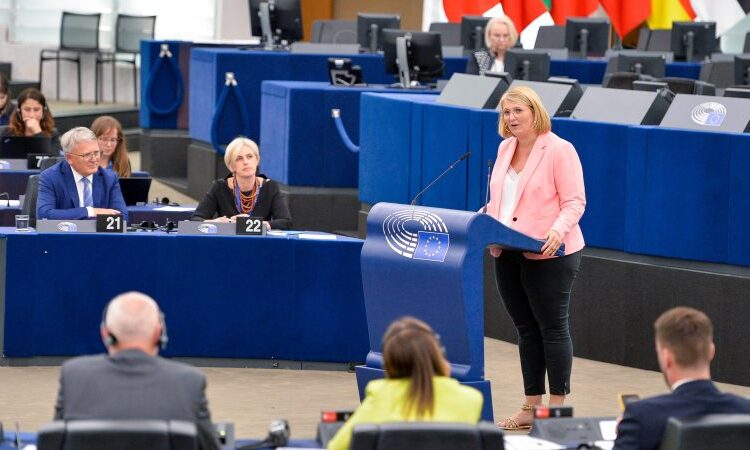
With broad, cross-party support, the European Parliament voted on Wednesday (14 June) in favour of an own-initiative report calling for a directive to ban unpaid traineeships.
The report comes as the Commission plans to update the 2014 Quality Framework for Traineeships, which lacked the quality standards voted in on Wednesday.
“We’ve all been trainees. We know that traineeships are a springboard toward a job,” liberal MEP Marie-Pierre Vedrenne said, “but the current framework for traineeships is merely increasing social inequality. The current framework does not provide sufficient support for those from deprived areas.”
In addition to mandating pay for trainees in the “open market,” meaning post-grad traineeships not connected to formal education, the report also recommends access to health insurance, unemployment, and pension schemes.
European Commissioner for Jobs and Socials Rights Nicolas Schmit spoke in concert with MEPs supporting the direction of the report, highlighting how young people’s conditions have changed significantly since 2014.
“Many young people have suffered from the impact of COVID-19, and many continue to suffer from the increasing cost of living,” Schmit said. The Commissioner affirmed that “under no circumstances” should employers be allowed to use traineeships to replace entry-level positions.
The parliamentary report requires that all trainees be provided with a mentor and learning objectives, separating these positions from entry-level work.
However, by the time of writing this article, the EU Commission could not yet say whether it would follow up on the Parliament’s report using a new directive, as the Parliament called for, or by a mere update of the current non-binding recommendations.
While the support for the report was very broad, with a large majority voting in favour, some MEPs, mainly from the right, disagreed.
Dominique Bilde, a French MEP from the far-right ID group, said a directive forcing paid traineeships would be another overstep by the EU into national competency. She mentioned last year’s Minimum Wage Directive as an example of supranational labour protections that will “undermine the entire system” if implemented.
“Our businesses are best placed to know their own needs rather than Brussels technocrats,” Bilde said.
Organised labour, meanwhile, saw the report as a victory, following on the heels of the Minimum Wage Directive.
“For the European Trade Union Confederation, what we’re trying to achieve at a broader scale is equality across Europe,” said Tea Jarc, Confederal Secretary for ETUC. “This means that we need to ensure upward convergence, that we cannot just leave everything to the member states who are not delivering,” she told EURACTIV, arguing for binding legislation instead of mere recommendations.
While centre-right MEPs from the European People’s Party (EPP) spoke in favour of providing quality traineeships during the debate, the party also put forward a failed amendment to change the Parliament’s report from calling for a proposal for a legally binding decision from the Commission to only calling for a recommendation.
José Gusmão, a Left MEP from Portugal, criticised their amendment attempt as a form of “fake politics,” where MEPs from the centre-right support the objectives of the proposal but act to “empty it of its contents.”
Helping the young
Mark McNulty, board member of the European Youth Forum, highlighted the proposal’s cross-party support, especially in the committee stage where each parliament grouping voted in favour.
Under the slogan “Can you afford to work for free?” the European Youth Forum has advocated ending unpaid traineeships since the beginning of 2022.
“Decent jobs cannot be kept only for those whose parents can afford to pay their bills while they work for free,” McNulty told EURACTIV. “Young people deserve fair wages for their work and their rights to be respected in the workplace. The Parliament’s vote validates that the majority of European citizens want to put an end to unpaid work.”
Looking ahead to next year’s EU elections, ETUC’s Jarc said that it would be the first that many young people who lived through the COVID-19 pandemic and the cost-of-living crisis will be able to vote in, as well.
“It’s really the time to step up and deliver for all the young people who are going to evaluate European institutions at the European elections based on what has been delivered,” she told EURACTIV.
[Edited by János Allenbach-Ammann/Alice Taylor]






